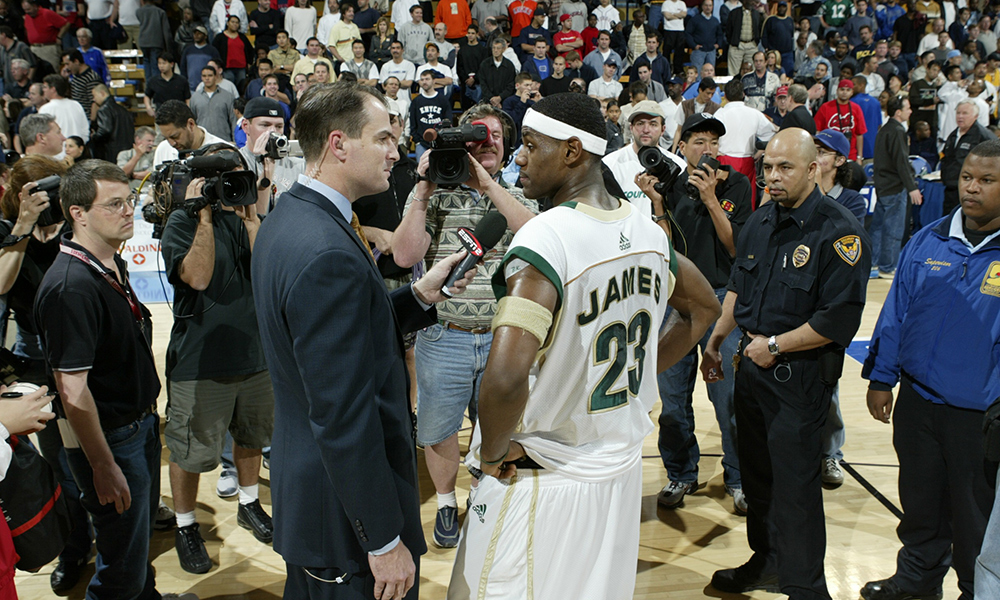
韋德布什(Wedbush)分析師丹·艾夫斯(Dan Ives)以對科技股的生動(dòng)評論而聞名,,人工智能芯片巨頭英偉達(dá)(Nvidia)經(jīng)常成為他生動(dòng)評論的對象,。
上周四,他繼續(xù)看好英偉達(dá),,將其比作史上最偉大的籃球運(yùn)動(dòng)員之一。
艾夫斯在接受彭博電視臺采訪時(shí)表示:“如果你看看英偉達(dá),,就這個(gè)故事的最終走向而言,,這就像是高中時(shí)期的勒布朗?!?/p>
在隨后的采訪中,,他又回到了這個(gè)類比,并表示英偉達(dá)之所以像年輕的勒布朗·詹姆斯,,是因?yàn)樗h(yuǎn)遠(yuǎn)領(lǐng)先于其他競爭對手,,是“獨(dú)一無二的選擇”。
在發(fā)表這番評論時(shí),,盡管英偉達(dá)上周三晚些時(shí)候發(fā)布的財(cái)報(bào)超出了預(yù)期,,但投資者仍在推低其股價(jià)。
不過,,盡管華爾街的擔(dān)憂主要集中在即將推出的Blackwell芯片的延期上,,艾夫斯表示,首席執(zhí)行官黃仁勛(Jensen Huang)的營收預(yù)期仍然強(qiáng)勁,,盡管低于分析師最樂觀的預(yù)期,,但還是平息了這些擔(dān)憂。
他在談到英偉達(dá)的財(cái)報(bào)時(shí)補(bǔ)充道:“財(cái)報(bào)來了,。他們兌現(xiàn)了承諾,。我認(rèn)為,對科技股來說,,這將為反彈提供動(dòng)力,。”
根據(jù)他在亞洲的渠道調(diào)查,,艾夫斯估計(jì)Blackwell芯片的營收可能達(dá)到數(shù)百億美元,,并將該公司的模糊預(yù)期歸因于黃仁勛不愿透露戰(zhàn)略。
他還吹捧了英偉達(dá)在更廣泛的科技領(lǐng)域的乘數(shù)效應(yīng),,稱在其芯片上花費(fèi)的每一美元都會(huì)在整個(gè)行業(yè)產(chǎn)生8-10倍的連鎖反應(yīng),。
艾夫斯認(rèn)為,未來三年人工智能領(lǐng)域的資本支出將達(dá)到1萬億美元,,是他六個(gè)月前預(yù)測的兩倍,。
他補(bǔ)充說,對英偉達(dá)芯片的需求也在加速擴(kuò)大,除了微軟(Microsoft),、OpenAI,、亞馬遜(Amazon)和谷歌(Google)等所謂的超大規(guī)模客戶之外,,隨著更多人工智能用例的出現(xiàn),,其他企業(yè)也在加緊努力。
“羅馬非一日建成,,人工智能革命亦是如此,,如今人工智能已經(jīng)開始形成合力?!?/p>
艾夫斯并不是唯一一個(gè)無視股市對英偉達(dá)財(cái)報(bào)最初反應(yīng)的華爾街分析師,。大多數(shù)分析師仍將該公司股票歸為“買入”類別。
美國銀行(Bank of America)全球研究部重申了買入評級,,并將其股票目標(biāo)價(jià)從150美元上調(diào)至165美元,,稱英偉達(dá)仍是“生成式人工智能周期的主要受益者”,并懇請投資者“忽略季度噪音”,。
英偉達(dá)股價(jià)上周五收于119.37美元,,周跌幅約為8%。
凱投宏觀(Capital Economics)亞太區(qū)市場主管托馬斯·馬修斯(Thomas Matthews)在一份報(bào)告中表示:“我們認(rèn)為,,盡管投資者對英偉達(dá)利潤的快速增長明顯感到失望,,但人工智能的漲勢仍將持續(xù)下去?!保ㄘ?cái)富中文網(wǎng))
譯者:中慧言-王芳
韋德布什(Wedbush)分析師丹·艾夫斯(Dan Ives)以對科技股的生動(dòng)評論而聞名,,人工智能芯片巨頭英偉達(dá)(Nvidia)經(jīng)常成為他生動(dòng)評論的對象。
上周四,,他繼續(xù)看好英偉達(dá),,將其比作史上最偉大的籃球運(yùn)動(dòng)員之一。
艾夫斯在接受彭博電視臺采訪時(shí)表示:“如果你看看英偉達(dá),,就這個(gè)故事的最終走向而言,,這就像是高中時(shí)期的勒布朗?!?/p>
在隨后的采訪中,,他又回到了這個(gè)類比,并表示英偉達(dá)之所以像年輕的勒布朗·詹姆斯,,是因?yàn)樗h(yuǎn)遠(yuǎn)領(lǐng)先于其他競爭對手,,是“獨(dú)一無二的選擇”。
在發(fā)表這番評論時(shí),,盡管英偉達(dá)上周三晚些時(shí)候發(fā)布的財(cái)報(bào)超出了預(yù)期,,但投資者仍在推低其股價(jià),。
不過,盡管華爾街的擔(dān)憂主要集中在即將推出的Blackwell芯片的延期上,,艾夫斯表示,,首席執(zhí)行官黃仁勛(Jensen Huang)的營收預(yù)期仍然強(qiáng)勁,盡管低于分析師最樂觀的預(yù)期,,但還是平息了這些擔(dān)憂,。
他在談到英偉達(dá)的財(cái)報(bào)時(shí)補(bǔ)充道:“財(cái)報(bào)來了。他們兌現(xiàn)了承諾,。我認(rèn)為,,對科技股來說,這將為反彈提供動(dòng)力,。”
根據(jù)他在亞洲的渠道調(diào)查,,艾夫斯估計(jì)Blackwell芯片的營收可能達(dá)到數(shù)百億美元,,并將該公司的模糊預(yù)期歸因于黃仁勛不愿透露戰(zhàn)略。
他還吹捧了英偉達(dá)在更廣泛的科技領(lǐng)域的乘數(shù)效應(yīng),,稱在其芯片上花費(fèi)的每一美元都會(huì)在整個(gè)行業(yè)產(chǎn)生8-10倍的連鎖反應(yīng),。
艾夫斯認(rèn)為,未來三年人工智能領(lǐng)域的資本支出將達(dá)到1萬億美元,,是他六個(gè)月前預(yù)測的兩倍,。
他補(bǔ)充說,對英偉達(dá)芯片的需求也在加速擴(kuò)大,,除了微軟(Microsoft),、OpenAI、亞馬遜(Amazon)和谷歌(Google)等所謂的超大規(guī)??蛻糁?,隨著更多人工智能用例的出現(xiàn),其他企業(yè)也在加緊努力,。
“羅馬非一日建成,,人工智能革命亦是如此,如今人工智能已經(jīng)開始形成合力,?!?/p>
艾夫斯并不是唯一一個(gè)無視股市對英偉達(dá)財(cái)報(bào)最初反應(yīng)的華爾街分析師。大多數(shù)分析師仍將該公司股票歸為“買入”類別,。
美國銀行(Bank of America)全球研究部重申了買入評級,,并將其股票目標(biāo)價(jià)從150美元上調(diào)至165美元,稱英偉達(dá)仍是“生成式人工智能周期的主要受益者”,,并懇請投資者“忽略季度噪音”,。
英偉達(dá)股價(jià)上周五收于119.37美元,周跌幅約為8%。
凱投宏觀(Capital Economics)亞太區(qū)市場主管托馬斯·馬修斯(Thomas Matthews)在一份報(bào)告中表示:“我們認(rèn)為,,盡管投資者對英偉達(dá)利潤的快速增長明顯感到失望,,但人工智能的漲勢仍將持續(xù)下去?!保ㄘ?cái)富中文網(wǎng))
譯者:中慧言-王芳
Wedbush analyst Dan Ives has a reputation for colorful quotes on tech stocks, and AI chip giant Nvidia has often been the target of his rhetorical arsenal.
On Thursday, he continued to make the bull case for Nvidia, comparing it to one of the greatest basketball players of all time.
“If you look at Nvidia here, this is LeBron in high school in terms of where this story is ultimately going,” Ives told Bloomberg TV.
Later in the interview, he circled back to the comparison and said the reason why Nvidia resembles a young LeBron James is because it’s so far ahead of any other competitor and is “the only game in town.”
The remarks came as investors were sending Nvidia stock lower despite an earnings report that blew away forecasts late Wednesday.
But while Wall Street’s concerns were focused on delays to the forthcoming Blackwell chips, Ives said CEO Jensen Huang put to rest those worries with revenue guidance that was still robust, even if it fell short of the most aggressive analyst views.
“They came. They delivered,” he added about Nvidia earnings. “And I think for tech, this is going to put fuel in that rally.”
Based on his channel checks in Asia, Ives estimated that Blackwell revenue could reach tens of billions dollars, attributing the company’s vaguer guidance to Huang being reluctant to reveal his playbook.
He also touted a multiplier effect Nvidia has across the broader tech landscape, saying every dollar spent on its chips ripples through the sector by a factor of 8-10 times.
That’s as Ives sees $1 trillion of capital expenditures on AI over the next three years—double his forecast from just six months ago.
Demand for Nvidia chips is also accelerating and widening beyond the so-called hyperscaler customers like Microsoft, OpenAI, Amazon, and Google, with other enterprises stepping up as more AI use cases emerge, he added.
“Rome wasn’t built in a day, neither will the AI revolution,” he predicted. “It’s starting to come together.”
Ives wasn’t the only Wall Street analyst looking past the initial stock market reaction to Nvidia’s earnings report. Most still put shares in the “buy” category.
Bank of America Global Research reiterated a buy rating and raised its price target on shares from $150 to $165, saying Nvidia remains the “key genAI cycle beneficiary” and imploring investors to “ignore quarterly noise.”
Nvidia stock closed Friday at $119.37, representing a weekly loss of about 8%.
“We think the AI rally has further to run, despite investors’ apparent disappointment with Nvidia’s rapid profit growth,” Thomas Matthews, Capital Economics’ head of markets, Asia Pacific, said in a note.






